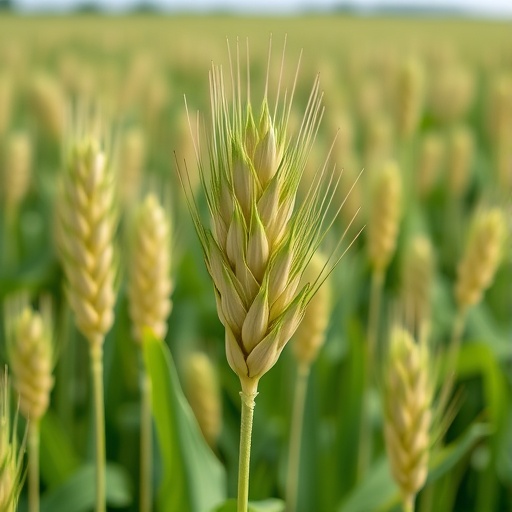In recent years, the detrimental effects of elevated ozone (O₃) levels and climate change have posed significant challenges to global agriculture. However, a groundbreaking study reveals that elevated carbon dioxide (CO₂) levels may provide a promising solution for mitigating these impacts. Researchers Surabhi, S., Gupta, S.C., and Pande, V. have published their findings in Environmental Science and Pollution Research, focusing on how enhanced CO₂ can alleviate O₃-induced stress in wheat crops, specifically two cultivars of Triticum aestivum, under fully open-air field conditions.
In their research, the scientists measured the physiological and biochemical responses of wheat plants exposed to both elevated CO₂ and O₃ levels. Wheat, a staple food for a significant portion of the world’s population, is particularly susceptible to O₃ pollution, which can stunt growth, reduce yield, and ultimately threaten food security. Understanding how elevated CO₂ can counteract these stressors is vital for developing effective agricultural practices in a changing climate.
The study demonstrated that elevated CO₂ not only increased the plants’ growth and yield but also positively influenced their metabolomic profiles. Metabolomics, the scientific study of chemical processes involving metabolites, provides critical insights into how plants respond to environmental stressors. Through careful analysis, the researchers found that the wheat cultivars adapted remarkably well when subjected to higher CO₂ concentrations alongside O₃, showcasing resilience that could be instrumental for future crop production.
One of the standout findings of the research was that the elevated CO₂ exposure led to an increase in photosynthetic rates, especially under O₃ stress. This finding aligns with existing literature indicating CO₂’s role in enhancing photosynthetic efficiency, allowing plants to harness sunlight more effectively. With climate change projected to increase CO₂ concentrations, optimizing wheat cultivation under these conditions could become a significant focus for agricultural scientists and farmers alike.
Furthermore, the researchers noted changes in the metabolic pathways of the wheat cultivars when exposed to elevated CO₂. This alteration facilitated increased production of primary metabolites associated with growth and development, such as sugars and amino acids. As a result, the study highlights the potential of utilizing elevated CO₂ environments to improve the nutritional quality of wheat, thereby benefiting both growers and consumers.
The experiments were conducted in fully open-air field conditions, which adds substantial practical relevance to the findings. Unlike many controlled environment studies, this approach better simulates real-world conditions that crops face. Therefore, the results provide valuable insights that can help optimize agronomic practices in different environments that confront the dual challenges of O₃ pollution and climate change.
Researchers also delved into the biochemical responses of the wheat plants. They measured antioxidant enzyme activity, which demonstrated increased resilience of the plants against oxidative stress caused by O₃ exposure. The ability to mitigate oxidative damage is crucial for maintaining plant health, and the scientists observed that elevated CO₂ played a protective role in reinforcing these defense mechanisms.
Additionally, the study explored the implications for agricultural practices on a broader scale. As global food production systems are under increasing pressure from climate variations, the knowledge gained from such research could guide cultivation techniques that utilize elevated CO₂ to enhance yields in wheat and potentially other crops.
The findings emphasize the need for further research into the interactions between elevated CO₂ and various environmental stressors. Understanding the specific physiological and biochemical pathways involved will be essential for harnessing the benefits of CO₂ without inadvertently leading to negative consequences, such as increased pest and disease pressures, often linked to rapid plant growth rates.
Importantly, the implications of this research extend beyond wheat cultivation. As agricultural systems globally face the risk of diminished productivity due to climate change, insights into the resilience plants exhibit under stress become indispensable. This knowledge could pave the way for breeding initiatives aimed at developing crop varieties that thrive under anticipated future conditions, providing food security for future generations.
In conclusion, the findings of Surabhi and colleagues underscore a hopeful narrative amidst the ongoing discourse on climate change impacts. By harnessing the advantages of elevated CO₂, agronomists may unlock innovative strategies to optimize crop production in an increasingly polluted atmosphere. This research not only contributes to our understanding of plant responses but also demonstrates a proactive approach to ensuring sustainable agriculture in the face of environmental challenges.
As we move forward, ongoing research will help to refine these findings and explore their applicability across different crops, soil types, and climatic conditions. Increased collaboration among scientists, agronomists, policymakers, and farmers will be vital in translating this knowledge into actionable practices that can sustain agricultural productivity and ensure food security throughout the 21st century.
The interplay of CO₂ and O₃ in agriculture is a dynamic realm worthy of further exploration. Unraveling these complex interactions promises to unlock the future of farming in an era defined by climate variability, ensuring that we can meet the demands of a growing global population while safeguarding our natural resources.
With the findings from Surabhi et al., a pathway emerges that offers hope and strategies for managing climate impact on agriculture, showcasing the potential of research to guide effective solutions in one of humanity’s greatest challenges.
Subject of Research: Effects of elevated CO₂ on O₃-induced stress in wheat
Article Title: Elevated CO₂ ameliorates O₃-induced stress and enhances growth, metabolomic, and yield attributes of two wheat (Triticum aestivum L.) cultivars under fully open-air field conditions.
Article References:
Surabhi, S., Gupta, S.C., Pande, V. et al. Elevated CO2 ameliorates O3-induced stress and enhances growth, metabolomic, and yield attributes of two wheat (Triticum aestivum L.) cultivars under fully open-air field conditions.
Environ Sci Pollut Res (2025). https://doi.org/10.1007/s11356-025-37174-w
Image Credits: AI Generated
DOI: https://doi.org/10.1007/s11356-025-37174-w
Keywords: Elevated CO₂, ozone stress, wheat growth, metabolomics, food security.




